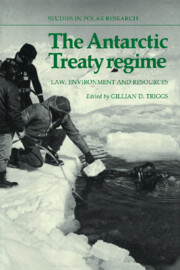Book contents
- Frontmatter
- Contents
- List of contributors
- List of Antarctic Treaty Parties
- Foreword
- Introduction
- Frontispiece: Map of national claims
- Part I Antarctica: physical environment and scientific research
- Part II The Antarctic Treaty regime: legal issues
- Part III The Antarctic Treaty regime: protecting the marine environment
- Part IV The Antarctic Treaty regime: minerals regulation
- Part V Whither Antarctica? Future policies
- 18 Introduction
- 19 Current and future problems arising from activities in the Antarctic
- 20 Antarctica: the claims of ‘expertise’ versus ‘interest’
- 21 Whither Antarctica? Alternative strategies
- Part VI Conclusion
- Selected reading
- Appendix 1
- Appendix 2
18 - Introduction
Published online by Cambridge University Press: 20 January 2010
- Frontmatter
- Contents
- List of contributors
- List of Antarctic Treaty Parties
- Foreword
- Introduction
- Frontispiece: Map of national claims
- Part I Antarctica: physical environment and scientific research
- Part II The Antarctic Treaty regime: legal issues
- Part III The Antarctic Treaty regime: protecting the marine environment
- Part IV The Antarctic Treaty regime: minerals regulation
- Part V Whither Antarctica? Future policies
- 18 Introduction
- 19 Current and future problems arising from activities in the Antarctic
- 20 Antarctica: the claims of ‘expertise’ versus ‘interest’
- 21 Whither Antarctica? Alternative strategies
- Part VI Conclusion
- Selected reading
- Appendix 1
- Appendix 2
Summary
An objective of the British Institute's conference, Whither Antarctica?, was to consider the future of Antarctic management. The following three papers, each of which recognises that the Antarctic Treaty Parties must make accommodation to external or outside interests, provide a stimulus for some new thinking about Antarctic regulation. With the successful negotiation of the 1982 Convention on Law of the Sea, some states have attempted to transfer the concept of common heritage of mankind to Antarctica. The assertion that Antarctica is the common heritage of mankind is, as yet, little more than a political aspiration. It has little legal content in so far as it is applied in Antarctica and it gives rise to confusion as to its consequences. Zain-Azraai moves beyond rhetoric by presenting the moral and legal bases for wider international participation in decision-making for Antarctica. He explains the dilemma of non-Treaty states which have the opportunity of joining the Antarctic Treaty System. To join is to imply that reform is possible from within the system while some non-Treaty Parties believe that radical changes can be achieved only through a wider international forum. J. A. Heap recognises that the Antarctic Treaty system is, in principle, no more or less effective than other international agreements. However, his experiences in Antarctic management have convinced him of the international ‘fact of life’ that a wider universal regime will represent the lowest common denominator and that regulations will be honoured in the breach rather than in observance.
- Type
- Chapter
- Information
- The Antarctic Treaty RegimeLaw, Environment and Resources, pp. 199 - 200Publisher: Cambridge University PressPrint publication year: 1987

